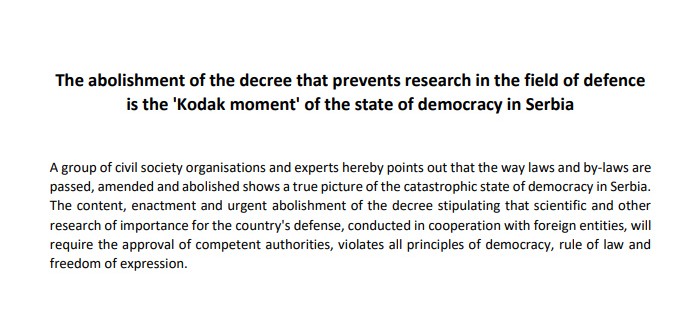A group of civil society organisations and experts hereby points out that the way laws and by-laws are passed, amended and abolished shows a true picture of the catastrophic state of democracy in Serbia. The content, enactment and urgent abolishment of the decree stipulating that scientific and other research of importance for the country’s defense, conducted in cooperation with foreign entities, will require the approval of competent authorities, violates all principles of democracy, rule of law and freedom of expression.
The regulation in question – which the government non-transparently passed, only to later abolish it – would restrict academic freedoms and violate the Constitution of the Republic of Serbia, the right to freedom of expression, the European Convention on Human Rights and the International Covenant on Human and Civil Rights. It would make it completely impossible to conduct independent research in many different fields, from natural and social sciences to mathematics, to the research of ores and mineral resources. In the context of the current fight against dirty technologies in Serbia, the latter particularly raises doubts about the legislator’s intentions. The above means that the Government could deny consent to research conducted in cooperation with foreign entities in these areas if it arbitrarily assesses that such research would threaten the country’s defence. This would open up the possibility of abuse and prevention of free and independent research and public information.
The decree is not only contrary to Serbia’s declarative commitment to joining the EU; imposing restrictions on cooperation of domestic researchers with foreign entities would also seriously hinder international scientific and research cooperation of faculties, institutes and citizens’ associations from Serbia that are financed from foreign funds. This would actually set a barrier that would prevent the public from being able to control the state authorities’ possible abuses: researchers would not be able to interview whistleblowers who react to unlawful activities, while researches would be prevented even from conducting public opinion surveys – it would be enough for the competent authorities to refuse to give approval under the pretext that the activity would endanger national security.
This is the second time that the government is trying to pass this sort of a decree. The attempt from 2017 was prevented by the strong reaction of the public. In order to eliminate the danger of this or a similar regulation being passed again, we ask that the disputed Article 71a of the Defence Act – based on which yesterday’s Decree was passed and later abolished – be abolished. However, there are fears that the reasons for this latest attempt to abolish transparency and stifle freedom of speech are rooted in our country’s ever stronger alliances with regimes that are known for much more brutal confrontations with political opponents, independent media and non-governmental organisations.
Just like the recent examples of the adoption, abolishment and amendment of two laws that led to mass civil protests, this is another proof that there is no division of power and independence of institutions in Serbia. Now that it has been reaffirmed that not only the laws, but also the by-laws are the result of the will of the President of Serbia, and that the procedures defined by the Constitution are no more than ornaments that help simulate the rule of law, it is clear that civil society remains one of the few barriers to full autocracy. If similar attacks on the civil sector continue, even that last bulwark of democracy in Serbia will be destroyed. For this reason, we call on the public, the media, non-governmental organisations, the academic community, activists and human rights defenders to raise their voices against such intentions of the government.
Signed by:
- ASTRA
- Belgrade Centre for Security Policy
- Belgrade Centre for Human Rights
- CRTA
- Civic initiatives
- Committee of Lawyers for Human Rights
- Drug Policy Network South East Europe





